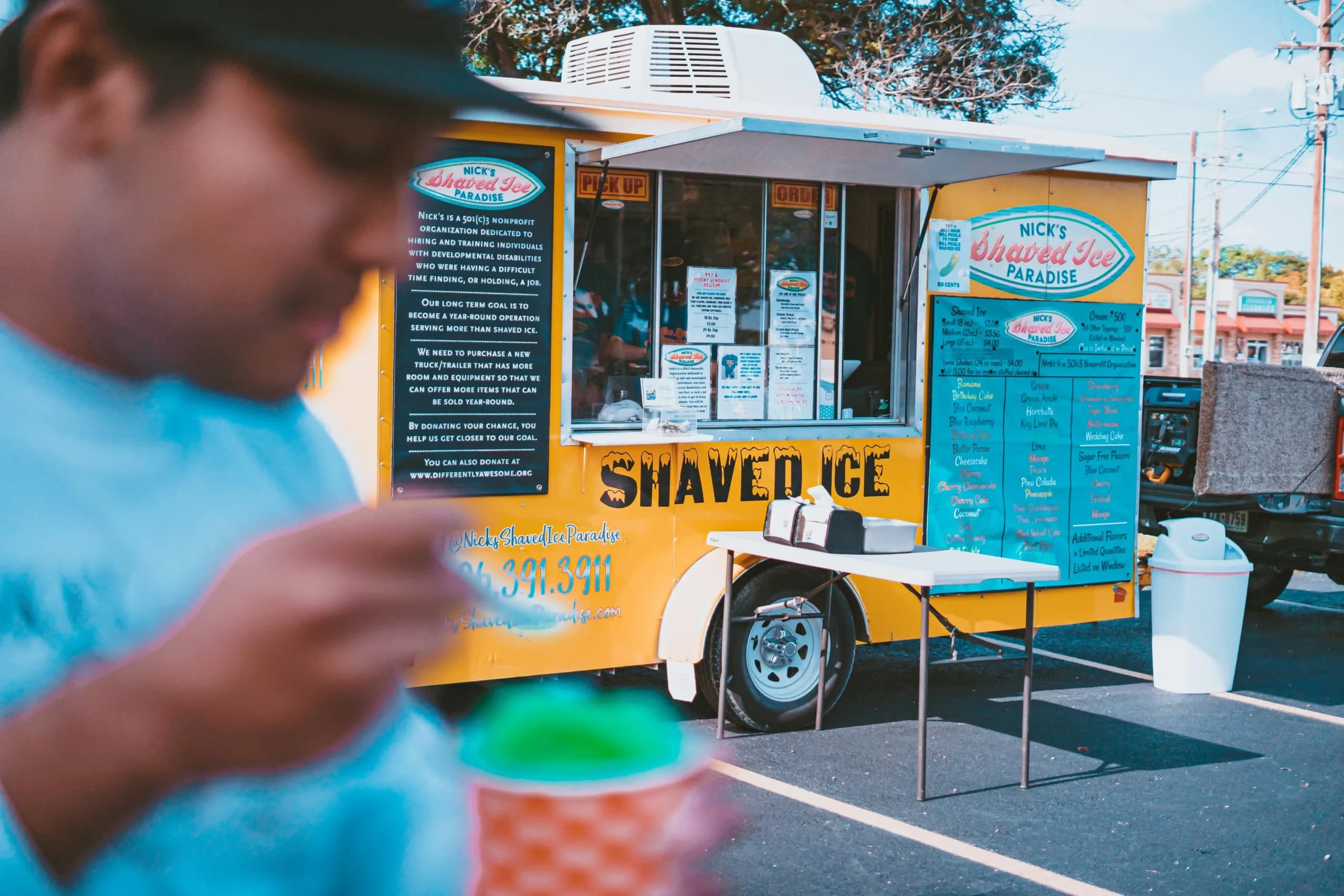Starting a food truck in Virginia can be both exciting and profitable. According to data from a nationwide survey of food truck owners, food trucks in Virginia generate a median annual revenue of about $380,163, highlighting a strong and growing demand for mobile dining in the state. With vibrant urban centers like Richmond and seasonal tourist spots such as Virginia Beach, new operators have plenty of opportunities to tap into hungry crowds year-round.
But before you start serving your best dishes to eager customers, you need to take care of an important step: securing the right licenses and permits. Without them, your food truck cannot operate legally, and local health departments take compliance very seriously.
1. Business license and sales tax registration
In Virginia, you must register your business with the State Corporation Commission (SCC) and obtain a local business license from the city or county where you operate. Alongside this, you will need to register for a sales tax permit with the Virginia Department of Taxation. This allows you to legally collect and remit sales tax on taxable goods like prepared food.
You can register your business online through the SCC’s Clerk’s Information System and apply for your sales tax permit via the Virginia Tax website. Some localities may require additional registration steps, so it’s best to check with your local Commissioner of the Revenue office. Make sure you keep your business license and sales tax permit on hand in your truck at all times.
2. Certified food protection manager & food handler cards
Virginia food safety laws require at least one person in charge of the food truck to have a Certified Food Protection Manager (CFPM) credential, which can be earned through accredited programs such as ServSafe. The training covers food handling, sanitation, and preventing foodborne illnesses, and the certificate is valid for five years.
In addition, some localities in Virginia require all employees who handle food to obtain a food handler card. Training typically takes two to three hours and covers safe food preparation, storage, and hygiene. Costs vary by provider but are usually affordable.
3. Mobile food unit permit
In Virginia, there isn’t a single statewide permit for mobile food units. Instead, each city or county’s local health department issues its own permit. Reach out to the health department in your area, such as Richmond City Health District, Fairfax County Health Department, or Virginia Beach Department of Public Health, where you intend to operate, since requirements and fees may differ.
To get started, visit their official website or call their office to request the mobile food unit permit application packet, which typically contains instructions, an inspection checklist, and all required forms. Mobile food unit permits often require:
- A completed application
- Proof of commissary kitchen agreement (if applicable)
- Proposed menu
- Floor plan of the truck
- Fire safety compliance documents
Submit your completed application and applicable fee directly to the local health department, typically ranging anywhere from about $100 to $500, depending on the locality and scope of your operation, then schedule your pre-operational inspection. The inspector will review your setup on-site before approving your permit.
Processing times can vary from one to four weeks depending on the locality, so begin this process well ahead of your planned launch date.
4. Health permit
Before opening for business, your food truck must pass a health inspection to verify compliance with Virginia’s food safety regulations. Inspectors will check for proper food storage temperatures, clean and sanitary surfaces, functioning handwashing stations with hot and cold water, and pest prevention measures.
Health inspections are not one-and-done. Many localities require annual inspections or additional checks if you modify your truck or menu. Scheduling inspections early is key, as health departments may have limited appointment availability during peak seasons.
Below is a quick reference table showing examples of localities in Virginia that require additional checks beyond the standard annual inspection:
| Locality | Additional Checks Required |
| Richmond City | Re-inspection required after any menu change or major equipment upgrade |
| Fairfax County | Quarterly water quality testing for onboard water systems |
| Virginia Beach | Semi-annual sanitation review for high-volume vendors |
| Norfolk | Pre-event inspection for participation in large public festivals |
| Arlington County | Mid-year inspection for trucks using propane or open flames |
5. Commissary kitchen agreement
Virginia requires most food trucks to operate in conjunction with a licensed commissary kitchen, often referred to as a food truck commissary. This is a facility where you can prepare food, store supplies, dispose of waste, and refill your water tanks in compliance with health codes. Even if your truck is fully equipped, some cities still require proof of commissary use.
A commissary agreement must be submitted to the health department during your permit application. Many commercial kitchens and shared-use facilities rent space to food trucks, often on hourly or monthly terms.
6. Fire safety inspection
If your truck uses propane, fryers, grills, or any open flame, the local fire marshal will need to inspect it. They may check:
- If a Class K fire extinguisher is present and accessible
- If the suppression system is serviced and properly tagged
- If propane tanks are secure and lines are in good condition
- If the truck’s ventilation meets regulatory requirements
Contact your local fire department to schedule an inspection and request their checklist so you can prepare accordingly. The inspection criteria can vary depending on the type of food truck you operate and the location where you plan to station your business.
7. Vehicle registration and insurance
When you operate a food truck in Virginia, your vehicle counts as a commercial vehicle, which means there are specific truck permits and legal steps you need to take before hitting the road. Your first stop is the Virginia Department of Motor Vehicles (DMV) to register your truck, just as you would any other business vehicle. You’ll need to provide proof of ownership, your vehicle identification number (VIN), a filled-out application, and payment for the registration fees.
If your truck is on the heavier side or you’re towing something extra, like a smoker or trailer, you may also need a commercial driver’s license (CDL). Not all operators will need one, so it’s best to confirm with the Virginia DMV or your local office.
Once you’ve got registration sorted, you’ll need insurance in place before serving a single customer. At a minimum, you should carry:
- Commercial auto insurance to cover damage to the truck and liability if an accident happens while driving
- General liability insurance to protect against claims of injury, property damage, or foodborne illness
- Workers’ compensation insurance if you have employees, to cover them for work-related injuries such as burns or slips while setting up
Keep in mind that many cities, counties, and event organizers won’t let you operate without proof of coverage. Start shopping for a policy early, compare your options, and make sure it meets both the legal requirements and the realities of running your business.
8. Location permits and parking rules
Each Virginia city and county has its own zoning and parking rules for food trucks. For example, Richmond designates specific food truck zones downtown, while Virginia Beach requires written consent from private property owners for most operating spots. Fairfax County enforces distance restrictions from schools and active restaurants, and Norfolk limits operations in certain historic or high-traffic areas.
Some cities, like Arlington, have specific event-related permits that must be obtained separately. These differences mean you should always confirm local rules before setting up.
To find out if your city or county has specific zoning or parking rules, start by contacting the local zoning or planning department, as well as the local health department. They can provide current maps, ordinances, and guidelines. You can also check the city or county website for published rules or designated food truck zones.
9. Alcohol licenses and permits
If you plan to serve alcohol from your food truck, you must obtain the appropriate license from the Virginia Alcoholic Beverage Control Authority (ABC). The type of license you need depends on what you plan to serve (beer, wine, mixed drinks) and how you plan to serve it.
ABC licensing in Virginia can take several weeks to months, so it’s good to start well in advance. You can apply directly through the Virginia Alcoholic Beverage Control Authority’s online licensing portal, where you’ll choose the specific license type for your service (beer, wine, mixed drinks, etc.).
Be prepared to provide business details, zoning approval, and undergo a background check. In most cases, it’s best to apply before your health inspection so both processes can move forward at the same time, helping you avoid launch delays.
If your food truck will serve alcohol at a specific event, submit your application at least 60–90 days beforehand to allow for review, possible public notice requirements, and any necessary hearings.
Renewal dates to remember
If you want to keep your Virginia food truck running without hiccups, you must stay on top of the renewal dates for your permits, licenses, and certifications. Missing these deadlines can interrupt your business operations or even cause temporary shutdowns.
Use the table below as a quick reference and update it with your own renewal dates so you’re always ahead:
| Permit or License | Renewal Frequency | Issuing Authority |
| Business license | Annually | Local city or county Commissioner of the Revenue |
| Sales tax registration | No renewal (update if info changes) | Virginia Department of Taxation |
| Certified Food Protection Manager | Every 5 years | Accredited provider (e.g., ServSafe) |
| Food handler card | Every 2–3 years (varies by locality) | Local health department or approved provider |
| Mobile food unit permit | Annually | Local health department |
| Health permit | Annually (or as required) | Local health department |
| Commissary kitchen agreement | Annually | Local health department |
| Fire safety inspection | Annually | Local fire marshal |
| Vehicle registration | Annually | Virginia DMV |
| Commercial auto insurance | Ongoing policy | Insurance provider |
| General liability insurance | Ongoing policy | Insurance provider |
| Workers’ compensation insurance | Ongoing policy | Insurance provider |
| Alcohol license (if applicable) | Annually | Virginia ABC Authority |
Serve great food in VA with a side of compliance
Running a food truck in Virginia isn’t just about making mouthwatering dishes; it’s about making sure your business is set up for lasting success. Every permit, inspection, and license you secure is more than a rule to follow. It’s a promise to your customers that you value their safety, trust, and experience.
When you combine your culinary talent with smart planning and compliance, you’re not just feeding people, but you’re building a brand they’ll remember and seek out again and again.
In a state where the food truck scene is as competitive as the flavors are bold, staying on top of the details is what keeps your wheels rolling and your business growing.

Rebecca Hebert, Sales Development Representative
Rebecca Hebert
Sales Development Representative
Rebecca Hebert is a former restaurant industry professional with nearly 20 years of hands-on experience leading teams in fast-paced hospitality environments. Rebecca brings that firsthand knowledge to the tech side of the industry, helping restaurants streamline their operations with purpose-built workforce management solutions. As an active contributor to expansion efforts, she’s passionate about empowering restaurateurs with tools that genuinely support their day-to-day operations.
